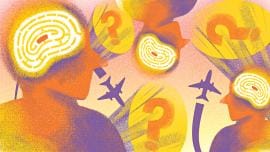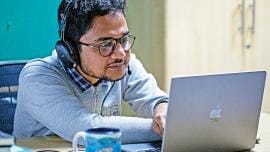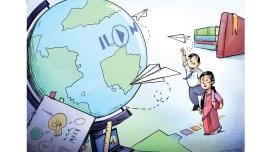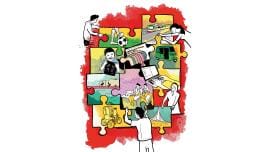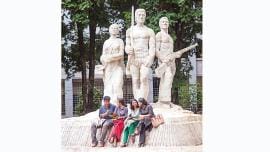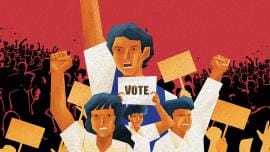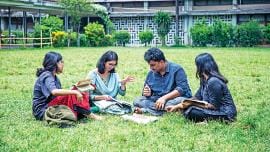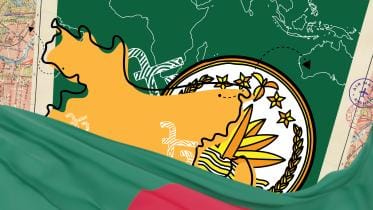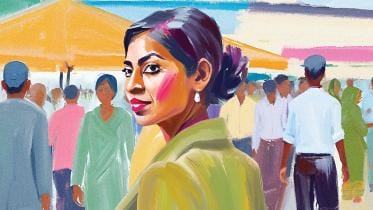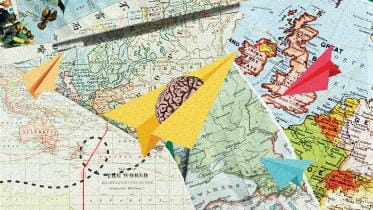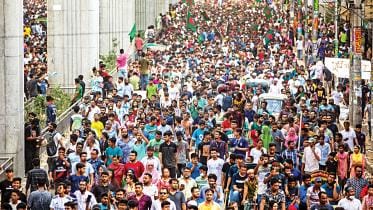We want NRBs to come back. But then what?
19 February 2025, 18:00 PM
Future Forged: Youth at the Helm
State of freelancers in Bangladesh: Challenges, ways forward
19 February 2025, 18:00 PM
Future Forged: Youth at the Helm
Digital classrooms: Transforming education for marginalised communities
19 February 2025, 18:00 PM
Future Forged: Youth at the Helm
Bridging the gap: The struggle to modernise teacher training in Bangladesh
19 February 2025, 18:00 PM
Future Forged: Youth at the Helm
Tackling economic disparities: A journey towards Bangladesh 2.0
19 February 2025, 18:00 PM
Future Forged: Youth at the Helm
The role of higher education institutions in attracting global talent
19 February 2025, 18:00 PM
Future Forged: Youth at the Helm
Barriers to youth participation in politics and ways to overcome them
19 February 2025, 18:00 PM
Future Forged: Youth at the Helm
Education reforms: Aligning curriculum with future job markets
19 February 2025, 18:00 PM
Future Forged: Youth at the Helm
The role of social media in youth political activism
19 February 2025, 18:00 PM
Future Forged: Youth at the Helm
How to build a conducive environment for innovation and research
19 February 2025, 18:00 PM
Future Forged: Youth at the Helm
We want NRBs to come back. But then what?
Reverse brain drain, a highly idealised concept, has been making waves on social media recently.
19 February 2025, 18:00 PM
State of freelancers in Bangladesh: Challenges, ways forward
In Bangladesh, a thriving freelance economy has emerged as a critical source of income for thousands of young professionals.
19 February 2025, 18:00 PM
Digital classrooms: Transforming education for marginalised communities
In an increasingly interconnected world, education remains the most powerful tool to break the cycle of poverty and inequality. However, for marginalised communities, access to quality education often remains a distant dream. The advent of digital classrooms is rapidly altering this landscape, bridging the gap between privilege and disadvantage. At the Jaago Foundation, we have witnessed firsthand how technology can transform lives, offering opportunities to those who might otherwise be left behind.
19 February 2025, 18:00 PM
Bridging the gap: The struggle to modernise teacher training in Bangladesh
In the digital age, educational technology (edtech) is revolutionising teacher training worldwide.
19 February 2025, 18:00 PM
Tackling economic disparities: A journey towards Bangladesh 2.0
Economic disparity has been a recurring theme in the history of Bangladesh, shaping its past, influencing its present, and challenging its aspirations for the future. From tales of tyranny to the struggle for independence, the narrative of inequality has been a constant companion in the nation’s journey. As Bangladesh sets its sights on a new era, dubbed ‘Bangladesh 2.0’, the call for reducing economic disparity is louder than ever, driven largely by the youth who spearheaded the July Uprising of 2024.
19 February 2025, 18:00 PM
The role of higher education institutions in attracting global talent
Bangladesh’s struggle with brain drain is not new. According to data collected from 175 countries between 2007 and 2024, the ‘Human Flight and Brain Drain Index’ indicates that Bangladesh has the 37th highest propensity for brain drain.
19 February 2025, 18:00 PM
Barriers to youth participation in politics and ways to overcome them
The youth have long been a driving force behind Bangladeshi political movements. From the language movement of 1952, liberation war of 1971, anti-authoritarian movement of 1990 which toppled the dictator Hussain Muhammad Ershad, and the recent July revolution of 2024 led to the fall of the dictator Sheikh Hasina, student-led mass movement, they have repeatedly proven their ability to stand up for justice, democracy, and change.
19 February 2025, 18:00 PM
Education reforms: Aligning curriculum with future job markets
It is often considered cliche to say “Education is the backbone of a nation”, but it cannot be far from an important truth for Bangladesh.
19 February 2025, 18:00 PM
The role of social media in youth political activism
It’s no secret that the majority now consumes news on social media. From short bits and clips to in-depth deep dives and podcasts, the role of social media in news consumption and circulation cannot be overlooked.
19 February 2025, 18:00 PM
How to build a conducive environment for innovation and research
In Bangladesh, academia is often one of the most overlooked aspects that has the potential to greatly contribute to the country’s sustainable development.
19 February 2025, 18:00 PM
Unlocking Bangladesh’s potential through digital connectivity
In the 21st century, the notion of infrastructure has evolved beyond roads, bridges, and railways. The new lifeline for progress is digital infrastructure—specifically, access to affordable and reliable internet.
19 February 2025, 18:00 PM
Leveraging the Bangladeshi diaspora: A generational opportunity for national development
In the weeks following August 5, interest from non-resident Bangladeshis (NRBs) in the professional sector surged. Messages poured in: “Tell me how I can help; I’ll move back,” and “I don’t need to make money—I’ll work for free.
19 February 2025, 18:00 PM
How the July revolution reshaped Bangladesh’s youth
History has its moments—points of inflection where societies, seemingly stagnant and indifferent, erupt with untold energy.
19 February 2025, 18:00 PM
Editor’s Note
The dawn of a new Bangladesh is upon us, shaped by the unwavering spirit of its youth. The historic events of July 2024, when a generation rose to reclaim its future, have set in motion a transformation unlike any before. The fall of a dictatorship was not merely a change in governance—it was a testament to the power of young voices demanding accountability, justice, and a seat at the table. Today, that vision is unfolding in ways both profound and promising.
19 February 2025, 18:00 PM
Influence of the July uprising on youth activism
There’s no denying that July altered the political reality of Bangladesh. The uprising toppled a deeply entrenched despot and unleashed a wave of change that felt as sudden as it was transformative.
19 February 2025, 18:00 PM
From brain drain to brain gain: Revitalising Bangladesh through diaspora and national engagement
“Even if they call me away, my heart will always remain in my motherland,” echoes Kazi Nazrul Islam.
19 February 2025, 18:00 PM
How to build a conducive environment for innovation and research
In Bangladesh, academia is often one of the most overlooked aspects that has the potential to greatly contribute to the country’s sustainable development. With the rise in the conversation of the causes of ‘brain drain’, it stands as a critically important point to talk about research and innovation alongside the many limitations to creating innovative new changes that hold us back.
19 February 2025, 18:00 PM
A comparative analysis of countries that reversed brain drain
According to a report published in 2023, the number of Bangladeshi students leaving the country every year tripled from 16,609 in 2008 to about 49,151 in 2022.
19 February 2025, 18:00 PM
The Bangladesh edtech market: Where is it going?
Edtech (education technology) has come a long way since its inception. In Bangladesh, the landscape has continued to evolve, with more and more players entering the market with every passing year.
19 February 2025, 18:00 PM
Can the youth revive democracy in Bangladesh?
The youth, as key drivers of inclusivity, are critically examining the current state of democracy in our country. For them, it is less a triumph than a test—a moment of possibility, shadowed by the weight of history.
19 February 2025, 18:00 PM



